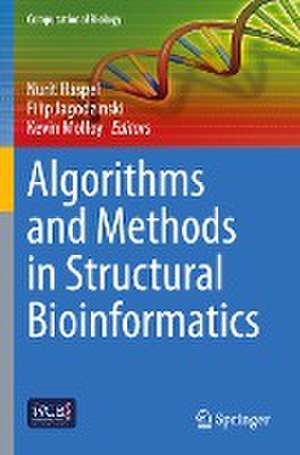Algorithms and Methods in Structural Bioinformatics: Computational Biology
Editat de Nurit Haspel, Filip Jagodzinski, Kevin Molloyen Limba Engleză Paperback – 3 sep 2023
In this book we focus on a number of topics in Structural Bioinformatics: Cryo-EM structural detection, protein conformational exploration, elucidation of molecular binding surface using geometry, the effect of mutations, insertions and deletions on protein structural stability, and protein-ligand binding.
| Toate formatele și edițiile | Preț | Express |
|---|---|---|
| Paperback (1) | 637.06 lei 6-8 săpt. | |
| Springer International Publishing – 3 sep 2023 | 637.06 lei 6-8 săpt. | |
| Hardback (1) | 643.30 lei 6-8 săpt. | |
| Springer International Publishing – 2 sep 2022 | 643.30 lei 6-8 săpt. |
Din seria Computational Biology
- 20%
 Preț: 539.14 lei
Preț: 539.14 lei - 15%
 Preț: 645.60 lei
Preț: 645.60 lei - 15%
 Preț: 633.68 lei
Preț: 633.68 lei - 5%
 Preț: 1434.18 lei
Preț: 1434.18 lei - 18%
 Preț: 945.79 lei
Preț: 945.79 lei -
 Preț: 322.31 lei
Preț: 322.31 lei - 18%
 Preț: 945.13 lei
Preț: 945.13 lei - 15%
 Preț: 644.95 lei
Preț: 644.95 lei -
 Preț: 447.56 lei
Preț: 447.56 lei - 15%
 Preț: 643.65 lei
Preț: 643.65 lei - 15%
 Preț: 648.89 lei
Preț: 648.89 lei - 18%
 Preț: 900.80 lei
Preț: 900.80 lei - 15%
 Preț: 653.14 lei
Preț: 653.14 lei -
 Preț: 400.85 lei
Preț: 400.85 lei - 15%
 Preț: 696.50 lei
Preț: 696.50 lei -
 Preț: 387.96 lei
Preț: 387.96 lei - 15%
 Preț: 645.79 lei
Preț: 645.79 lei - 20%
 Preț: 560.67 lei
Preț: 560.67 lei - 15%
 Preț: 653.65 lei
Preț: 653.65 lei - 15%
 Preț: 638.57 lei
Preț: 638.57 lei - 20%
 Preț: 575.99 lei
Preț: 575.99 lei - 18%
 Preț: 1112.15 lei
Preț: 1112.15 lei - 18%
 Preț: 785.42 lei
Preț: 785.42 lei - 20%
 Preț: 1047.22 lei
Preț: 1047.22 lei - 18%
 Preț: 1230.84 lei
Preț: 1230.84 lei
Preț: 637.06 lei
Preț vechi: 796.32 lei
-20% Nou
Puncte Express: 956
Preț estimativ în valută:
121.90€ • 127.27$ • 100.89£
121.90€ • 127.27$ • 100.89£
Carte tipărită la comandă
Livrare economică 04-18 aprilie
Preluare comenzi: 021 569.72.76
Specificații
ISBN-13: 9783031059162
ISBN-10: 3031059166
Pagini: 114
Ilustrații: IX, 114 p. 51 illus., 37 illus. in color.
Dimensiuni: 155 x 235 mm
Greutate: 0.19 kg
Ediția:1st ed. 2022
Editura: Springer International Publishing
Colecția Springer
Seria Computational Biology
Locul publicării:Cham, Switzerland
ISBN-10: 3031059166
Pagini: 114
Ilustrații: IX, 114 p. 51 illus., 37 illus. in color.
Dimensiuni: 155 x 235 mm
Greutate: 0.19 kg
Ediția:1st ed. 2022
Editura: Springer International Publishing
Colecția Springer
Seria Computational Biology
Locul publicării:Cham, Switzerland
Cuprins
1. Protein-Ligand Binding with Applications in Molecular Docking.- 2. Explaining Small Molecule Binding Specificity with Volumetric Representations of Protein Binding Sites.- 3. Machine Learning-based Approaches for Protein Conformational Exploration.- 4. Low Rank Approximation Methods for identifying Impactful Pairwise Protein Mutations.- 5. Detection and analysis of amino acid insertions and deletions.- 6. DeepTracerWeb Service for Fast and Accurate De Novo Protein Complex Structure Prediction from Cryo-EM.
Notă biografică
Nurit Haspel has been a member of the Department of Computer Science at the University of Massachusetts, Boston since 2009. She received her Ph.D. from Tel Aviv University in 2007. Her research lies in the areas of computational structural biology and structural bioinformatics. Her goal is to better understand the structure and flexibility of proteins, to model conformational changes in proteins, and to model protein-protein interactions. In her research, she focuses on both the development of novel algorithms and the application of state-of-the-art existing methodologies to various problems in molecular biology and biochemistry.
Filip Jagodzinski joined the faculty of Western Washington University in 2015. He earned his Ph.D. from the University of Massachusetts, Amherst in 2012, and his MS from Villanova and BS from Columbia University. With his undergraduate and graduate students, and in coordination with Machine Learning and biology and chemistrycollaborators, Filip develops computational recipes for predicting the structural properties of disease-causing protein mutants and inferring the effects of indels. Their tools are often disseminated via web servers or as open-source software.
Kevin Molloy joined the faculty at James Madison University in 2018. He earned his Ph.D. from George Mason University in 2015, his MS from George Mason in 2011, and his BS from George Mason in 1998. His research focuses on studying the flexibility of protein systems and the role this flexibility plays in their function, specifically in antimicrobial peptides. He is also developing algorithms to characterize the structural rearrangements that proteins undertake to fluctuate their functional roles and how amino acid sequence mutations impact these transitions.
Textul de pe ultima copertă
The three-dimensional structure and function of molecules present many challenges and opportunities for developing an understanding of biological systems. With the increasing availability of molecular structures and the advancing accuracy of structure predictions and molecular simulations, the space for algorithmic advancement on many analytical and predictive problems is both broad and deep. To support this field, a rich set of methods and algorithms are available, addressing a variety of important problems such as protein-protein interactions, the effect of mutations on protein structure and function, and protein structure determination. Despite recent advancements in the field, in particular in protein folding with the development of AlphaFold, many problems still remain unsolved.
In this book we focus on a number of topics in Structural Bioinformatics: Cryo-EM structural detection, protein conformational exploration, elucidation of molecular binding surface using geometry, the effect of mutations, insertions and deletions on protein structural stability, and protein-ligand binding.
Caracteristici
While there are multiple bioinformatics textbooks, very few focus solely on structural bioinformatics The book spans a broad range of current and challenging topics in Structural bioinformatics The book can be used both as a textbook for a course on algorithms in Bioinformatics
